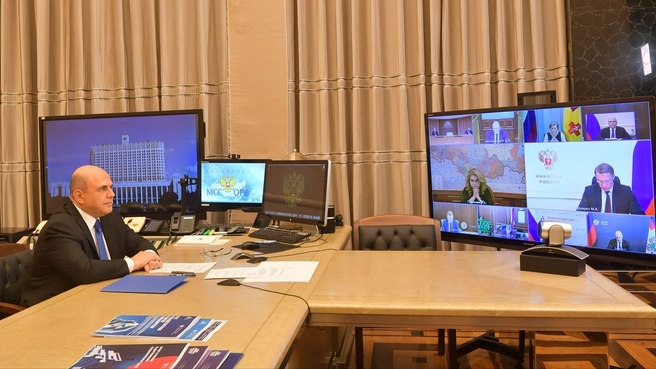Mikhail Mishustin’s opening remarks:
Good afternoon, colleagues.
The whole of Russia continues to fight COVID-19. The situation is still tense. We discussed this in detail during our meeting with the President last Wednesday. The incidence of the disease is declining in a number of regions. The numbers have fallen, including as a result of introducing non-working days pursuant to the President’s instructions. But there are still a lot of COVID-19 patients in other Russian regions. Over half a million medical workers are caring for them across the country. The majority of people infected with the severe form of the disease are those who failed to get vaccinated.
To be sure, all patients will continue to receive medical aid.
The federal centre is rendering maximum support to regional healthcare systems to help them cope with the high workload. Among other things, I am referring to the allocation of funds for purchasing medicines for both patients at hospitals and those getting treatment at home under medical supervision.
Pursuant to the President’s instructions, the Government has been monitoring daily the availability of oxygen and medicines needed to treat COVID-19 in the regions.
Moreover, the Government has decided to extend until the end of next year the previously issued registration certificates and temporary permissions to order medicines needed, among other things, for treating COVID. The simplified procedure for getting these documents will remain in place as well. This will make it possible to avoid interruptions in supplying medicines, to provide them to patients in good time, and to quickly put new medicines into circulation.
As for oxygen, we also discussed it at the meeting with the President. The Government is keeping tabs on this matter.
We are drawing on all the available resources to support medical organisations. Specifically, we are using the Defence Ministry’s capabilities. Oxygen producers will be able to use gratis the five rail tank cars owned by one of the military units until the end of January. This is a more rapid method of delivering oxygen to the regions. The Government has drafted the relevant directive.
But the most important thing is to forecast the needs of medical organisations well in advance, stock up on supplies, and identify problems before they arise.













